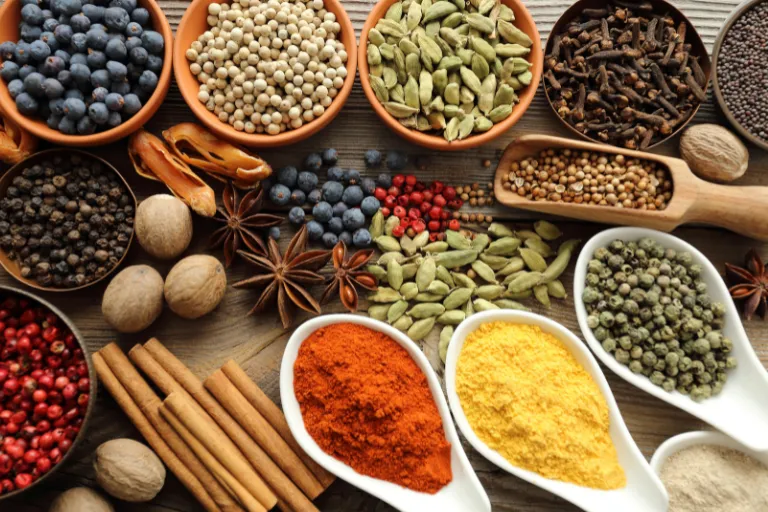Wichtige Punkte
- Ingwer, Kurkuma, Kreuzkümmel, Fenchel und andere bekannte kulinarische Gewürze enthalten aktive Pflanzenverbindungen —Gingerole, Curcumin, Anethol—, die die Verdauung erleichtern und ein ausgewogenes Darmmikrobiom unterstützen.
- Wissenschaftliche Studien zeigen, dass Ingwer die Magenentleerung beschleunigen kann, Kurkuma Dyspepsie-Symptome ähnlich wie Omeprazol lindern kann und Fenchel und Kreuzkümmel verdauungsenzymische und krampflösende Wirkungen haben.
- Traditionelle medizinische Systeme —vom Ayurveda bis zur chinesischen Kräuterkunde— empfehlen diese Gewürze seit Jahrhunderten; Heute hilft die Forschung, die beteiligten Mechanismen zu erklären.
- Dank der einfachen Zubereitung und der Tipps auf Teebasis lassen sich diese Gewürze ganz einfach in alltägliche Mahlzeiten integrieren.
Eine Prise Gewürz, eine Welt voller Verdauungsvorteile
Eine Prise Kurkuma verleiht Linsen eine goldene Note, ein Schuss Ingwer verleiht Kräuterwärme. In Küchen auf der ganzen Welt bieten diese Gewürze viel mehr als nur Geschmack —sie sind seit Jahrhunderten kulinarische Wissenschaft und die moderne Forschung holt nun auf.
Warum Gewürze einen Platz am Verdauungstisch verdienen
Verdauungsprobleme —wie Blähungen, Blähungen, langsame Verdauung oder ein gereizter Darm— betreffen Millionen von Menschen. Moderne Diäten mit wenig Ballaststoffen und viel verarbeiteten Lebensmitteln verschlimmern diese Symptome oft. Die Unterstützung einer gesunden Verdauung fördert eine effektive Nährstoffaufnahme, bessere Energie und ein allgemeines Wohlbefinden‑sein.
Viele Menschen haben täglich mit Verdauungsproblemen zu kämpfen
Verdauungsbeschwerden treten bei vielen Menschen fast täglich auf. Blähungen nach‑Mahlzeiten oder eine anhaltende Schwere können es schwierig machen, sich energiegeladen zu fühlen, während eine langsame Verdauung dazu führen kann, dass die Nahrung länger im Magen sitzt, als sie sollte. Manche leiden unter unregelmäßigem Stuhlgang —Schwingen zwischen Verstopfung, Durchfall oder beidem—, was frustrierend und unvorhersehbar sein kann. Andere leben mit einer anhaltenden, leichten‑ Darmentzündung, die die Nährstoffaufnahme und das allgemeine Wohlbefinden beeinträchtigt. Diese Symptome mögen zunächst geringfügig erscheinen, können sich aber mit der Zeit auf die Stimmung, das Energieniveau und sogar die langfristige‑ Gesundheit auswirken.
Was Gewürze zum Funktionieren bringt: Die Wissenschaft hinter dem Geschmack
Bioaktive Verbindungen, die das schwere Heben bewirken
- Ingwer (Gingerole, Shogaole)
Diese Verbindungen haben entzündungshemmende‑ und antioxidative Eigenschaften. Eine randomisierte Studie ergab, dass 1.200 mg Ingwerextrakt die Magenentleerung signifikant beschleunigten und die Antralkontraktionen bei Menschen mit funktioneller Dyspepsie im Vergleich zu Placebo erhöhten (Weltjournal für Gastroenterologie, 2008). Eine andere klinische Studie ergab ähnliche Ergebnisse bei gesunden Erwachsenen (Europäische Zeitschrift für Gastroenterologie und Hepatologie). - Kurkuma
Eine kürzlich durchgeführte randomisierte Doppel-‑Blindstudie mit 206 Personen mit funktioneller Dyspepsie ergab, dass Curcumin (250 mg, viermal täglich) die Verdauungssymptome über 28–56 Tage genauso wirksam reduzierte wie Omeprazol, ohne signifikante Neben-‑Wirkungsunterschiede (BMJ Evidenzbasierte Medizin, 2023). - Kreuzkümmel & Fenchel
Kreuzkümmel enthält Peptide und sekundäre Pflanzenstoffe, die Verdauungsenzyme unterstützen und antimikrobielle Eigenschaften aufweisen. Der Wirkstoff des Fenchels, Anethol, entspannt die Darmmuskulatur— und hilft, Krämpfe und Blähungen zu lindern. Diese traditionellen Anwendungen stimmen mit vorläufigen klinischen Erkenntnissen überein. - Schwarzer Pfeffer (Piperin)
While not directly digestive, piperine boosts curcumin’s bioavailability by up to 2,000%, enhancing turmeric’s effectiveness.
Gestaltung des Mikrobioms und Linderung von Entzündungen
Der regelmäßige Verzehr von Küchengewürzen wird mit einer größeren Vielfalt nützlicher Bakterien in Verbindung gebracht, wie zum Beispiel Bifidobakterium und Laktobazillen, zusammen mit einer Verringerung schädlicher Belastungen. Dieses Mikrobiomgleichgewicht unterstützt die Produktion kurzkettiger Fettsäuren, trägt zur Aufrechterhaltung der Integrität der Darmbarriere bei und beruhigt Entzündungen.
Von antiken Küchen bis hin zu modernen Forschungslaboren
Gewürze wie Ingwer, Kreuzkümmel, Fenchel und Kurkuma werden seit Jahrhunderten im Ayurveda, in der Traditionellen Chinesischen Medizin und in Kräutertraditionen des Nahen Ostens zur Linderung von Verdauungsstörungen, Blähungen und Beschwerden eingesetzt. Moderne klinische Forschung —die Effekte wie verbesserte Darmmotilität und verringerte Entzündungen zeigt— hilft zu erklären, warum diese Praktiken Bestand hatten.
Einfache, köstliche Möglichkeiten, Gewürze für die Verdauungsgesundheit zu verwenden
Wie viel und wie man sie zubereitet
- Ingwer: 1–2 g/Tag (½–1 TL) frisch oder pulverisiert; oder als Tee aufgebrüht.
- Kurkuma: ½–2 g/Tag in Rezepten oder goldener Milch; für eine bessere Aufnahme mit schwarzem Pfeffer und Fett (wie Olivenöl) kombinieren.
- Kreuzkümmel: ¼–1 TL in Bohnen, Getreide, Eintöpfen oder geröstetem Gemüse.
- Fenchelsamen: Kauen Sie ~1 Teelöffel nach den Mahlzeiten oder lassen Sie es in heißem Wasser ziehen, um Tee zuzubereiten.
- Andere sanfte Optionen: Zimt, Koriander, Kardamom als unterstützende Verdauungsgewürze.
Kochtipps für maximalen Nutzen
- Reiben Sie Ingwer und Kurkuma in Suppen, Smoothies, Currys oder Marinaden.
- Rösten Sie Kreuzkümmelsamen vor dem Kochen, um den Geschmack zu vertiefen und die Verdaulichkeit zu verbessern.
- Brauen Sie Fenchelsamen nach den Mahlzeiten in heißem Wasser, um Blähungen und Krämpfe zu lindern.
- Kombinieren Sie Kurkuma mit Olivenöl und schwarzem Pfeffer in herzhaften Gerichten, um die Curcuminaufnahme zu maximieren.
Wann Sie frei genießen können—und wann Sie sich bei einem Fachmann erkundigen sollten
In kulinarischen Mengen sind Gewürze im Allgemeinen sicher und gut verträglich. Allerdings können höher dosierte Kurkuma- oder Ingwerpräparate Wechselwirkungen mit blutverdünnenden Medikamenten, Blutzuckermedikamenten oder Gallenblasenproblemen haben. In seltenen Fällen wurde eine Kurkuma-Supplementierung mit leichten Magen-Darm-Beschwerden, allergischen Reaktionen oder erhöhten Leberenzymen —insbesondere bei hohen Dosen in Verbindung gebracht. Wenn Sie Medikamente einnehmen oder gesundheitliche Bedenken haben, konsultieren Sie vor Beginn der Einnahme konzentrierter Nahrungsergänzungsmittel einen qualifizierten Arzt.
Der Artikel stellt in keiner Weise eine medizinische Beratung dar. Bitte konsultieren Sie einen zugelassenen Arzt, bevor Sie eine Behandlung beginnen. Diese Website kann Provisionen für die in diesem Artikel erwähnten Links oder Produkte erhalten.
Quellen
- Wu et al., Europäische Zeitschrift für Gastroenterologie und Hepatologie (2008) – Effects of ginger on gastric emptying and motility. Link
- Ghayur & Gilani, Weltjournal für Gastroenterologie (2008) – Ginger extract and prokinetic activity in humans. Link
- Kongkam et al., BMJ Evidenzbasierte Medizin (2023) – Curcumin vs. omeprazole for functional dyspepsia. Link
- Health.com – Review of turmeric and probiotic interactions. Link
- EatingWell – Review of turmeric’s safety and medication interactions. Link
- Vogue – Summary of turmeric’s digestion benefits. Link




Turmeric + black pepper in my morning eggs has been a game changer. I feel lighter after meals and less bloated